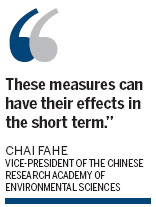10 steps taken to curb air pollution
Updated: 2013-06-15 07:47
By Wu Wencong (China Daily)
|
||||||||

The State Council outlined 10 measures on Friday to curb air pollution that is plaguing the country, vowing "tough measures for tough tasks".
The government should incorporate optimizing the country's economic structure and intensifying innovation with environmental protection efforts, according to a statement released after an executive meeting of the State Council, presided over by Premier Li Keqiang.
Topping the 10 measures is a target to reduce pollution emissions per unit of GDP by at least 30 percent in heavy- polluting industries before the end of 2017.
"These measures can have their effects in the short term," said Chai Fahe, vice-president of the Chinese Research Academy of Environmental Sciences.
"Given that adjusting industrial structures and altering development modes both require a relatively long process, raising the ability to control airborne pollutants by about one third first, using advanced technologies, is very important for now," he said.
This measure corresponds with a ministry-level move in February, when six heavy- polluting industries: thermal power, iron and steel, petrochemicals, cement, non-ferrous metals and chemicals, in 47 cities were asked to gradually comply with special international emission limits on airborne pollutants from March 1.
Chai told China Daily in an earlier interview the annual amount of smoke and dust from these six industries contributes more than 70 percent of total emissions.
"The level of dust concentration emitted by coal-burning boilers in thermal power plants has been reduced from 30 milligrams per cubic meter to the strictest in the world - 20 milligrams per cubic meter," he said.
The State Council also asked local governments to enact emergency management response measures during periods of heavy pollution, such as restricting traffic flow or placing emissions limits on polluting industries.
"This is an important signal sent by the State government, calling for all levels of governmental officials to treat heavy pollution as seriously as severe natural disasters like earthquakes," Chai said.
He added that an emergency plan in response to heavy air pollution has been raised to national level, rather than simply being a spontaneous policy of local governments.
Another measure that illustrates the government's determination to control air pollution is the emphasis placed on strengthening the implementation of the environmental impact assessment system.
Under this measure, no loans should be provided to projects that haven't passed the assessment, and no electricity or water should be offered to such projects.
Other measures confirmed include mandatory disclosure of environmental information by heavy-polluting industries and enterprises, tougher fines for illegal behavior, and cooperation between regions and large cities.

 Michelle lays roses at site along Berlin Wall
Michelle lays roses at site along Berlin Wall
 Historic space lecture in Tiangong-1 commences
Historic space lecture in Tiangong-1 commences
 'Sopranos' Star James Gandolfini dead at 51
'Sopranos' Star James Gandolfini dead at 51
 UN: Number of refugees hits 18-year high
UN: Number of refugees hits 18-year high
 Slide: Jet exercises from aircraft carrier
Slide: Jet exercises from aircraft carrier
 Talks establish fishery hotline
Talks establish fishery hotline
 Foreign buyers eye Chinese drones
Foreign buyers eye Chinese drones
 UN chief hails China's peacekeepers
UN chief hails China's peacekeepers
Most Viewed
Editor's Picks

|

|

|

|

|

|
Today's Top News
Shenzhou X astronaut gives lecture today
US told to reassess duties on Chinese paper
Chinese seek greater share of satellite market
Russia rejects Obama's nuke cut proposal
US immigration bill sees Senate breakthrough
Brazilian cities revoke fare hikes
Moody's warns on China's local govt debt
Air quality in major cities drops in May
US Weekly

|

|







